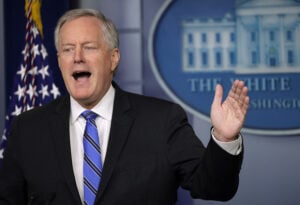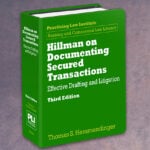Mark Meadows Says He Was Just Doing His White House Job When He Offered GA Officials Campaign Money For 2020 Recount
The crazy thing is, it might actually work.

(Photo by Alex Wong/Getty Images)
Late Monday night, a grand jury in Fulton County, Georgia indicted Donald Trump and 18 other co-conspirators for their efforts to steal the state’s 16 electoral votes in the 2020 election. Less than 24 hours later, Trump’s former chief of staff Mark Meadows filed a motion to remove the case to federal court under 28 U.S. Code § 1455.
It’s hardly surprising that Meadows beat his former boss to the punch. Trump has been very busy shitposting about “PHONEY FANI WILLIS,” the Fulton County District Attorney, and promising to put out “A Large, Complex, Detailed but Irrefutable REPORT on the Presidential Election Fraud which took place in Georgia” next week. Meanwhile, Meadows’s attorney George Terwilliger III moved to get the case out of Fulton Superior Court and into the Northern District of Georgia as a prelude to moving to dismiss the charges under the Supremacy Clause.

The Digital Transformation Imperative

The motion hits some of the rightwing talking points implying that they’re making it a crime to make phone calls now.
Nothing Mr. Meadows is alleged in the indictment to have done is criminal per se: arranging Oval Office meetings, contacting state officials on the President’s behalf, visiting a state government building, and setting up a phone call for the President. One would expect a Chief of Staff to the President of the United States to do these sorts of things.
But in the main, the argument is that Meadows was acting under color of his office when he coordinated Trump’s efforts to coerce state legislators and local officials to steal electoral votes from Joe Biden.
“The events giving rise to the indictment occurred during Mr. Meadows’s tenure as White House Chief of Staff and are directly related to that role,” his lawyers write.
Sponsored

Clio Users: New Ways To Add Value To Your Practice!

Documenting Secured Transactions: A New Guide For Practitioners

LawPay Pro Offers Upgraded Time And Billing Essentials

Documenting Secured Transactions: A New Guide For Practitioners
DA Willis will doubtless argue that the executive branch plays no role in state administration of elections, and that Trump’s own US Attorneys had investigated and found zero evidence of the fraud claims he was pushing after the election. What possible official business could Trump have been conducting when he pushed Secretary of State Brad Raffensperger to “find 11,780 votes, which is one more than we have, because we won the state?” And when Meadows messaged Raffensperger’s chief investigator on December 27, 2020 he appears to have been explicitly acting as an emissary of the campaign, writing ‘Is there a way to speed up Fulton county signature verification in order to have results before Jan 6 if the trump campaign assist financially.’”
Presumably Meadows will argue that he was helping the president take care that the laws of the nation be faithfully executed, rather than violating the Hatch Act. Trump will likely make a similar motion, as he did unsuccessfully with regard to the New York prosecution by Manhattan District Attorney Alvin Bragg. But former Justice Department lawyer Jeffrey Clark may be more successful if he ever gets through telling Americans to get off Netflix and “join a traditional church.” Clark is charged with participating in the conspiracy by trying to get the DOJ to send Georgia legislators a letter claiming to have found evidence of fraud which could have altered the outcome of the election. This was patently false, as his colleagues told him when they rebuffed his efforts. But there’s certainly a colorable claim that he was acting in his official capacity when he wrote the letter.
If any of the federal defendants make this argument successfully, it could have implications for everyone charged. As University of Texas Law Professor Lee Kovarsky observes on Twitter, multiple Circuits have held that removal applies to all co-defendants, even those who were never employed by the federal government. See Ely Valley Mines, Inc. v. Hartford Accident & Indemnity Co., 644 F.2d 1310, 1315 (9th Cir. 1981):
Thus, [28 USC] § 1442 represents an exception to the general rule (under §§ 1441 and 1446) that all defendants must join in the removal petition. Since the federal officer is the only one entitled to remove under § 1442, he alone can remove without other defendants joining in the petition, and the entire case is removed to the federal court.
This would suggest that Jeff Clark could successfully drag Sidney Powell, Rudy Giuliani, and Donald Trump along with him — which would arguably be the most useful thing he’s done in this whole sorry caper.
Sponsored

The Digital Transformation Imperative


Survey Results: A Perspective On The Private Markets
If indeed that happens, Lawfare’s Anna Bower explained to NBC’s Chris Hayes that Willis would still prosecute the case under Georgia law, and Trump would not be able to derail the case or pardon himself if re-elected.
But if they do succeed in getting themselves into federal court, the defendants will trade a slightly less pro-Biden jury pool for a spot on the docket of Judge Steven Jones, an Obama appointee. Of course, federal removal allows appeal to the Eleventh Circuit and the Supreme Court, so, YMMV.
Elizabeth Dye lives in Baltimore where she writes about law and politics and appears on the Opening Arguments podcast.







